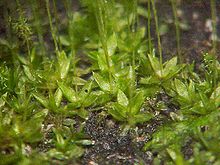This article needs additional citations for verification. (September 2020) |
| Funaria | |
|---|---|

| |
| Funaria hygrometrica | |
| Scientific classification | |
| Kingdom: | Plantae |
| Division: | Bryophyta |
| Class: | Bryopsida |
| Subclass: | Funariidae |
| Order: | Funariales |
| Family: | Funariaceae |
| Genus: | Funaria Hedw.[1] |
| Species | |
Funaria is a genus of approximately 210 species of moss. Funaria hygrometrica is the most common species. Funaria hygrometrica is called “cord moss” because of the twisted seta which is very hygroscopic and untwists when moist. The name is derived from the Latin word “funis”, meaning "a rope". In funaria root like structures called rhizoids are present.[2]
Capsules are abundant with the moss surviving as spore when conditions are not suitable.
Moss plant Funaria grows in dense patches or cushions in moist shady and cool places on rocks, walls or crevices during the rainy seasons. It has a height of 3–5 cm, a radial symmetry with a differentiation of an axis or stem, leaves or phylloids are multicellular colorless branched rhizoids with oblique septa.
These are primitive multicellular, autotrophic, shade loving, amphibious plants. They reproduce by spore formation. They have no vascular system. Root like structures called rhizoids are present. They show alternation of generation i.e. the gametophytic stage alternates with the sporophytic stage.
- ^ Tropicos
- ^ "Funaria in Flora of North America @ efloras.org". www.efloras.org. Retrieved 2020-09-16.